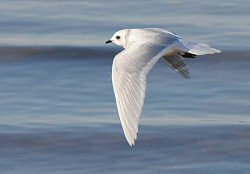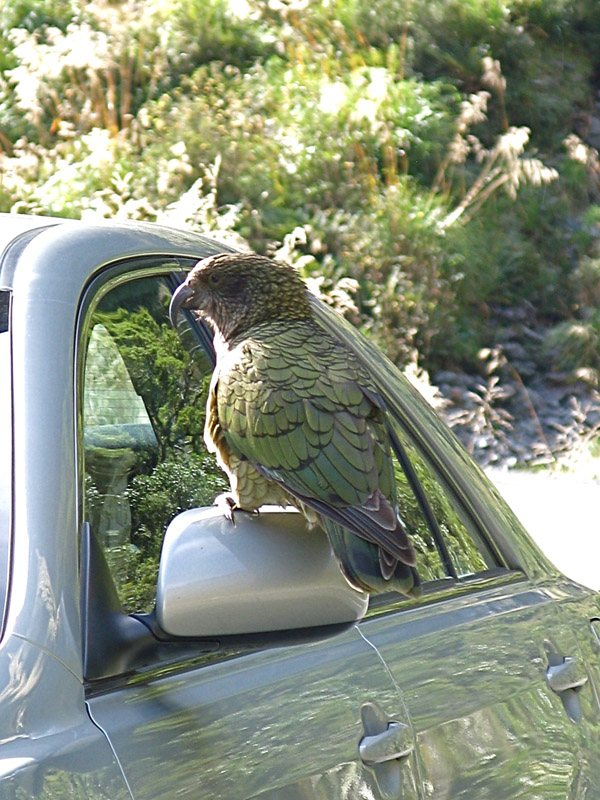Is birding green?
The Telegraph website of the UK has posted a short column hastily summarizing a research paper concluding that Birding Is Not Green, especially competitive birding and twitching. The Telegraph article is not very in-depth, refers mostly to Britain (although the issues are largely common to the US as well, and the primary author is at University of Illinois, and is a birder himself) and takes a bit of a snarky tone — you birders aren’t as green as you think — but it’s still worth a glance.
The author of the study points out that while chasing rarities, twitchers (the mostly British term for avid birders who mainly are interested in checking off bird species from their lists) log many gasoline-hogging hours in their vehicles, or taking long flights to see hard-to-find species or vagrants. A case in point from my own experience: many years ago a pinkish Ross’s Gull — usually an arctic bird — showed up near the Alton Lock and Dam on the Mississippi River north of St. Louis. People were coming from places as far away as Italy and South Africa to see that bird, because it was closer and easier to get to than the high arctic. And local birders made the drive twice or more, to log the bird in two separate years (it was at the New Year), and in two separate states, since it was at times visible from both the Missouri and Illinois side of the river! A much more recent Ross’s gull at the Salton Sea created a similar scene.
A case in point from my own experience: many years ago a pinkish Ross’s Gull — usually an arctic bird — showed up near the Alton Lock and Dam on the Mississippi River north of St. Louis. People were coming from places as far away as Italy and South Africa to see that bird, because it was closer and easier to get to than the high arctic. And local birders made the drive twice or more, to log the bird in two separate years (it was at the New Year), and in two separate states, since it was at times visible from both the Missouri and Illinois side of the river! A much more recent Ross’s gull at the Salton Sea created a similar scene.
(The photo above of the Salton Sea Ross’s Gull is by Henry Detweiler from the Southwest Birders website. I’ve used it here because it’s a very nice photo of a ROGU, not because Southwest Birders are involved in any way that I know of in the debate about greenness and birding.)
These Ross’s Gulls chases would be cited as examples of fuel being used profligately, although the opposite argument could be made as well: visiting the Salton Sea or Alton, Illinois — closer and less pristine habitats than, say, Churchill Manitoba — actually represents a greener way of seeing the gull. In addition, the Telegraph article leaves out the fact that many birders (in the States, at least), regularly carpool to spot their targets. Also ignored is that some eco-tours offer carbon offset opportunities for their trips. And that many “birdwatchers” bird greenly in their yards, or nearby hotspots they access on foot or by bike. Gilbert Water Ranch in Phoenix is a great place to bird by bike. Some competitive birding activities, such as Big Days or Christmas Bird Counts, make useful contributions to what’s known about seasonal populations and ranges of  birds, which for some might mitigate fossil fuel use to some degree. No one criticizes the Family Roadtrip Vacation for being a fuel-wasting chase to bag National Parks: instead, people talk about broadening the kids’ horizons, engaging in “quality family time” and bolstering local economies. Traveling birders spend money in local economies, too. I would question why birding has been singled out for this criticism in the press.
birds, which for some might mitigate fossil fuel use to some degree. No one criticizes the Family Roadtrip Vacation for being a fuel-wasting chase to bag National Parks: instead, people talk about broadening the kids’ horizons, engaging in “quality family time” and bolstering local economies. Traveling birders spend money in local economies, too. I would question why birding has been singled out for this criticism in the press.
(Left: Birding from the car in NZ: who’s birding who? Cheeky Kea! Photo: A.Shock)
There’s also a seriouly confusing and confused bit of content in the article that seems to quote the researchers as blaming birders for un-environmental practices because birders ignore pollution problems in bird-rich areas because birds tend to thrive there. Not enough time to sort that one out in this post; I suspect the original study states it more clearly.
However, I didn’t set out to write a defense of the Greenness of Birding: most birders are aware that their passion has some not-so-environmentally-friendly aspects, and try to offset them. The concept of Green Birding (like BIGBY) is not new; there are sites and posts all over the web — just plug “green birding” into your search engine and check a few of them out. But, the Telegraph article does provide a reminder that some birding practices are fuel-consumptive or carbon-emitting, and we need to be aware and pro-active to make birding as green an activity as possible.
This might be one of those times it’s best to read the source article for yourself. Here’s the reference:
Spencer Schaffner. Environmental Sporting: Birding at Superfund Sites, Landfills, and Sewage Ponds. Journal of Sport & Social Issues, 2009; 33 (3): 206.
I couldn’t access more than an abstract online without a subscription to the online reference service.
Here’s a link to an interview with the author of the study, from Science Daily. This has more detail than the Telegraph article, and perhaps better summarizes Schaffner’s conclusions.

here’s a link to the article (as a pdf): http://www.english.illinois.edu/-people-/faculty/schaffner/Schaffner%20JSSI%2033.3.pdf
Thanks for the link; I’ll check it out.